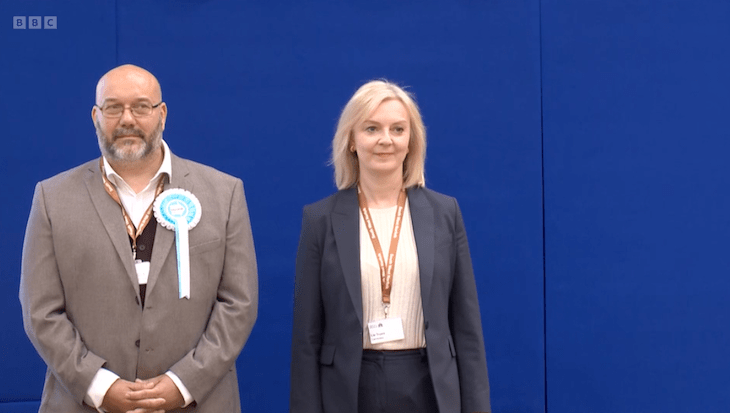Tonight was the first time since Liz Truss’s 49-day premiership that voters got to have their say on exactly what happened back in 2022, and what’s happened since. The verdict is in: Truss has suffered a devastating defeat in South West Norfolk, going from a 25,000 seat majority in 2019 (one of the safest Tory seats in the country) to losing to Labour candidate Terry Jermy, with a difference of just over 600 votes. The 26 per cent voter swing from Tories to Labour made Truss the first former prime minister to lose their seat in almost 90 years.
Were this any other MP, it would be easy to chalk up the result to the insurgence of Reform, which secured 9,958 votes – not far off Truss’s 11,217. But this is not a normal case. Truss may have been the most-mentioned MP in this election, as Labour used her brief stint in Downing Street to repeatedly attack the Tory party for economic incompetence. Plenty has been written about what happened in that small window of time – including the short- and medium-term impact of the infamous mini-Budget. But what’s clear from the Tories’ data polling is that what happened in autumn 2022 was an event the party never recovered from with voters. Much of that will have to do with mortgage rate increases, which skyrocketed after her mini-Budget announcements and remain notably high.
None of this ever stopped Truss from weighing into the debate – interventions seen, to put it generously, as unhelpful to the Tory attempt to get the government back on track. It was within a matter of months of standing down that Truss was defending her track record, trying to set the story straight (as she saw it) which included blaming almost every other actor besides herself. While she has never outright condemned Rishi Sunak’s government, she has played the role of internal opposition (that Sunak kept his seat tonight, despite the party’s painful defeat will likely be a sore spot for Truss and her allies).
Truss published her book, Ten Years to Save the West, as a warning – and a guidebook – for a return to ‘conservative’ policies. She founded the ‘Pop Con’ group (Popular Conservatism) as an attempt to shape the future of the Tory party after this election. It’s well-known in Tory circles that she had ambitions to return to a leadership role within the party – not as leader, but possibly back into a foreign policy brief, or a role targeted at party membership. All’s to say, Truss had every plan to keep going as an elected official. Indeed, it was a key pillar of her plans to prove, in retrospect, that her vision for the country was right.
Tonight’s loss might be more difficult for the former prime minister than her exit from Downing Street. The latter was a far bigger event, one that was reported around the world. But Truss’s long-term goal – to influence the future of the Tory party – relied on her keeping her seat. Truss is still, of course, a former prime minister, and will have access to plenty more resources than your average ousted MP. But her plans to play an active role in what happens next have largely evaporated.
But perhaps the biggest upset for Truss tonight is that the verdict on her legacy since becoming prime minister is no longer academic. The ultimate judge of right and wrong in politics is the voters. And they have clearly not been convinced by Truss’s version of recent history.








Comments